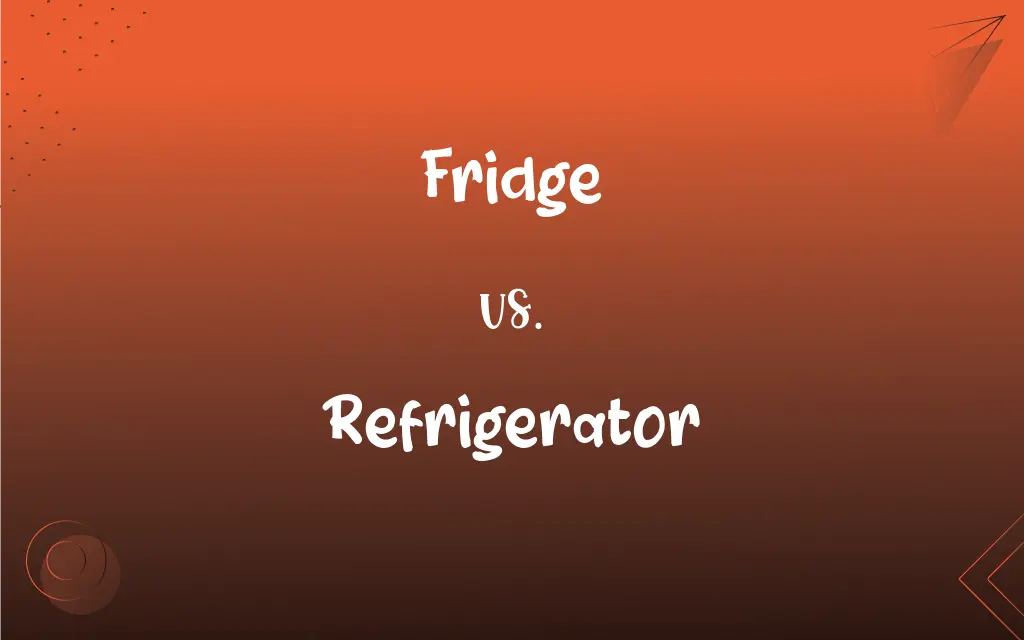Fridge vs. Refrigerator: What's the Difference?
Edited by Harlon Moss || By Janet White || Published on December 2, 2023
Fridge is a colloquial term for a refrigerator, an appliance for keeping food cold. Refrigerator is a household appliance used for storing food at low temperatures to preserve freshness.

Key Differences
The term fridge is a shortened, colloquial form of the word refrigerator. While both refer to the same appliance, fridge is often used in informal conversation.
Refrigerators are essential household appliances that operate by removing heat from their enclosed space to lower the temperature inside. The term fridge refers to the same process but is used more casually.
The word fridge is often used in everyday language and can be more relatable in casual settings. In contrast, refrigerator might be used in more formal or technical contexts.
Both fridge and refrigerator can come in various sizes and designs, offering features like freezers, ice makers, and different compartments, but the terms are interchangeable in referring to these variations.
Fridge is universally understood in everyday English, while refrigerator might be preferred in official documents, appliance manuals, or when specifying technical details.
ADVERTISEMENT
Comparison Chart
Formality
Informal, colloquial
Formal, technical
Usage
Common in everyday speech
Used in technical or official contexts
Origin
Shortened form of refrigerator
Original, full term for the appliance
Variations
Used to refer to all types
Also covers all types, including specifics like commercial refrigerators
Documentation
Less likely to be used in manuals or documents
More likely to appear in official documents and manuals
ADVERTISEMENT
Fridge and Refrigerator Definitions
Fridge
Short for refrigerator, used informally.
She checked the fridge for a snack.
Refrigerator
A large appliance for chilling and storing food.
The refrigerator broke down and needed repair.
Fridge
A cooling unit in a kitchen.
The fridge is making a strange noise.
Refrigerator
A cooling device used in households.
The refrigerator temperature needs adjusting.
Fridge
An appliance for storing food at low temperatures.
The cake needs to be kept in the fridge.
Refrigerator
An appliance for keeping food cold.
The refrigerator is an essential part of any kitchen.
Fridge
A common term for an appliance that cools food.
I put the milk back in the fridge.
Refrigerator
An electric appliance for food storage.
Their refrigerator has a built-in water dispenser.
Fridge
A household item for preserving perishables.
Our fridge is stocked with fresh vegetables.
Refrigerator
A machine for preserving food freshness.
They bought a new energy-efficient refrigerator.
Fridge
A refrigerator.
Refrigerator
An appliance, cabinet, or room for storing food or other substances at a low temperature.
Fridge
(informal) A refrigerator.
Refrigerator
A household appliance used for keeping food fresh by refrigeration (short form fridge).
Fridge
To place (something) inside a refrigerator to chill; to refrigerate.
Refrigerator
A similar device used to keep non-food items cold, such as blood, photographic film, drugs, or pharmaceuticals like insulin.
Fridge
To gratuitously kill, disempower, or otherwise remove (a character, usually female) from a narrative, often strictly to hurt another character (usually male) and motivate vengeance.
Refrigerator
One who has a chilling influence.
Fridge
To chafe or rub (something).
Refrigerator
That which refrigerates or makes cold; that which keeps cool.
Fridge
To chafe or rub.
Refrigerator
White goods in which food can be stored at low temperatures
Fridge
Synonym of fidge
Fridge
To rub; to fray.
Fridge
A refrigerator in which the coolant is pumped around by an electric motor
FAQs
What is a refrigerator?
A refrigerator is an appliance for keeping food and drinks cold.
Are "fridge" and "refrigerator" the same thing?
Yes, they refer to the same appliance, but "fridge" is more informal.
Can "refrigerator" be shortened to "frig"?
No, the common abbreviation is "fridge."
Is "fridge" used in formal writing?
"Fridge" is typically used in casual contexts, while "refrigerator" is more formal.
Are there different types of refrigerators?
Yes, there are various types, including top-freezer, bottom-freezer, side-by-side, and French door refrigerators.
What does "fridge" mean?
"Fridge" is a colloquial abbreviation for "refrigerator."
Do all fridges have freezers?
Most fridges have a freezer section, but some compact models may not.
Is the spelling of "fridge" different in British and American English?
No, "fridge" is spelled the same in both British and American English.
Can "fridge" be used as a verb?
Informally, "fridge" can be used as a verb meaning to put something in the fridge, though it's not standard usage.
Can "refrigerator" be abbreviated in other ways?
No, the most common and accepted abbreviation is "fridge."
Is "fridge" used in professional or technical contexts?
In technical contexts, "refrigerator" is preferred.
What's the origin of "fridge"?
"Fridge" comes from "refrigerator," with the "d" added for pronunciation ease.
Is "fridge" an American or British term?
"Fridge" is commonly used in both American and British English.
Is "fridge" used in scientific contexts?
In scientific contexts, the full term "refrigerator" is typically used.
Do "fridge" and "refrigerator" have different plural forms?
No, both terms become plural by adding an "s" (fridges, refrigerators).
Are there synonyms for "refrigerator"?
Common synonyms include "fridge" and "icebox," though "icebox" is outdated.
How do I choose between "fridge" and "refrigerator"?
Use "fridge" in casual speech or writing and "refrigerator" in formal or technical contexts.
Can "refrigerator" be used in any English-speaking country?
Yes, "refrigerator" is universally understood in English-speaking countries.
Does "fridge" have different meanings?
"Fridge" only refers to the appliance for cooling food.
Is "fridge" in the dictionary?
Yes, "fridge" is recognized in modern dictionaries.
About Author
Written by
Janet WhiteJanet White has been an esteemed writer and blogger for Difference Wiki. Holding a Master's degree in Science and Medical Journalism from the prestigious Boston University, she has consistently demonstrated her expertise and passion for her field. When she's not immersed in her work, Janet relishes her time exercising, delving into a good book, and cherishing moments with friends and family.
Edited by
Harlon MossHarlon is a seasoned quality moderator and accomplished content writer for Difference Wiki. An alumnus of the prestigious University of California, he earned his degree in Computer Science. Leveraging his academic background, Harlon brings a meticulous and informed perspective to his work, ensuring content accuracy and excellence.






































































